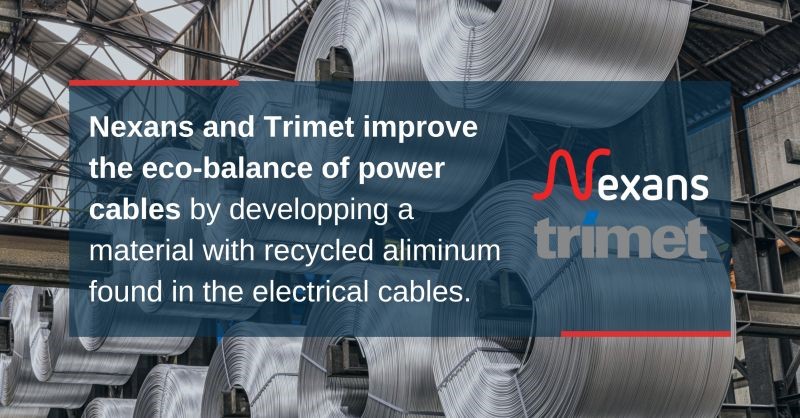

Trimet and Nexans have implemented a fundamental rule for enhancing the eco-balance of power cables. Through a joint development project, the two companies have yielded a material with recycled aluminium content for manufacturing aluminium rods instrumental in creating electrical wires.

Together the companies have developed this latest product that adheres to the high technical requirements and conductivity of the alloy while eradicating the product’s carbon footprint. Until this discovery, power cables were manufactured with the help of primary aluminium, which systematically kept increasing the manufacturing value.
Aluminium is infinitely recyclable, and its transformation process requires a comparatively lesser amount of energy than primary aluminium production. Moreover, a significant portion of carbon emissions can be curtailed through recycling. Yet, recycled aluminium might be loaded with impurities that can adversely affect the quality of a mended aluminium product.
The partnership programme between Nexans and Trimet focuses on actively streamlining raw material supply and phenomenal material generation. While elaborating on the procedure, it must be mentioned that Nexans has mastered sorting aluminium scrap at its production sites in Europe. This is being done with the help of a Nexans-Suez joint venture, RecyCâbles, which explicitly propels the creation of new electrical cables with recycled aluminium. By lending its recycling concept, renowned aluminium producer, Trimet, has overseen the closure of the material cycle, wherein the scrap obtained has been morphed into a high-quality aluminium alloy that can be modestly applied in mechanical and electrical solutions.
The Chief Operating Officer of Nexans, Vincent Dessale, exclaimed: “ Our project shows that recycling offers enormous potential to reduce CO2 emissions. I am proud that Nexans can now offer its customers a product that combines superior quality while ensuring a higher level of a circular economy. Nexans thus pursues its strategy to constantly look for new sources of value for its customers. ”
The CEO of Trimet Aluminium SE and President of Trimet Frances SAS, Philipp Schlüter, commented: “Recycling is an important component of sustainable aluminium production for us. The development of high-quality alloys with the smallest possible carbon footprint makes a significant contribution to this. ”
Nexans envisions vastly increasing the use of aluminium rods made with recycled aluminium in 2023. This will permit the company to suffice its customer’s growing demand for sustainable products with high ecological content. In accordance with the company’s journey for retribution, Trimet is expanding its profile of recycled products in the aluminium wire genre. With this profound manufacturing agenda in mind, Trimet is on its way to achieving a decarbonised production line while positively contributing to the energy transition sector.
Responses








